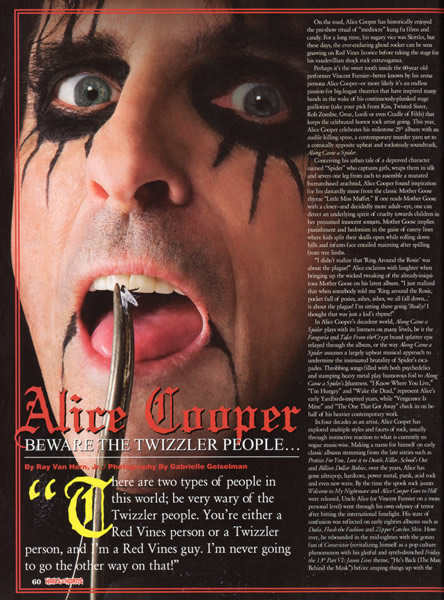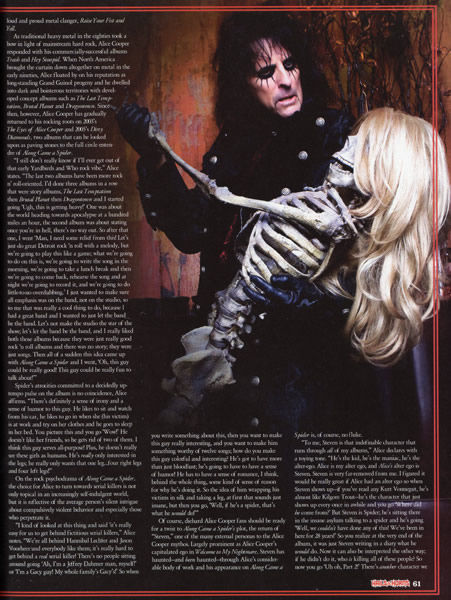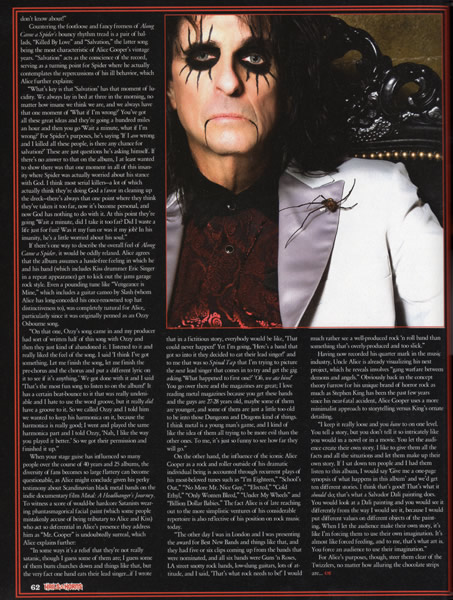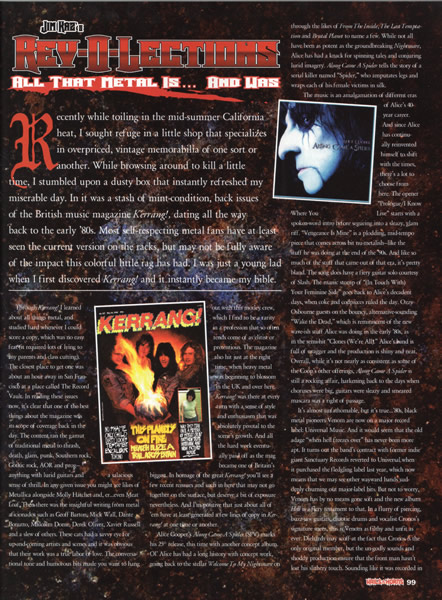Article Database
Beware the Twizzler people....
"There are two types of people in this world; be vary wary o fthe Twizzler people. You're either a Red Vines person or a Twizzler person, and I'm a Red Vines guy. I'm never going to go the other way!"
On the road, Alice Cooper has historically enjoyed the pre-show ritual of "mediocre" kung fu films and candy. For a long time, his sugary vice was Skittles, but these days the every-enduring ghoul rocker can be seen gnawing on Red Vines licorice before taking the stage for his vaudevillian shock rock extravaganza.
Perhaps it's the sweet tooth inside the 60-year old performer Vincent Furnier - better known by his arena persona Alice Cooper - or more likely it's an endless passion for big-league theatrics that have inspired many bands in the wake of his continuously-plunked stage guillotine (take your pick from Kiss, Twisted Sister, Rob Zombie, Gwar, Lordi or even Cradle of Filth) that keeps the celebrated horror rock artist going. This year, Alice Cooper celebrates his milestone 25th album with audile killing spree, a contemporary murder yarn set to a comically apposite upbeat and rocksteady soundtrack, Along Came a Spider.
Conceiving his urban tale of a depraved character named "Spider" who captures girls, wraps them in silk and severs one leg from each to assemble a mutated human-based arachnid, Alice Cooper found inspiration for his dastardly muse from the classic Mother Goose rhyme "Little Miss Muffet." If one reads Mother Goose with a closer - and decidedly more adult - eye, one can detect an underlying spirit of cruelty towards children in her presumed innocent sonnets. Mother Goose implies punishment and hedonism in the guise of cutesy lines where kids spill their skulls open while rolling down hills and infants face entailed maiming after spilling from tree limbs.
"I didn't realize that 'Ring Around the Rosie' was about the plague!" Alice exclaims with laughter when bringing up the wicked tweaking of the already-iniguitous Mother Goose on his latest album. "I just realized that when somebody told me 'Ring around the Rosie, pocket full of posies, ashes, ashes, we all fall down...' is about the plague! I'm sitting there going 'Really? I thought that was just a kid's rhyme!' "
In Alice Cooper's decadent world, Along Came a Spider plays with its listeners on many levels, be it the Fangoria and Tales From the Crypt brand splatter epic relayed through the album, or the way Along Came a Spider assumes a largely upbeat musical approach to undermine the insinuated brutality of Spider's escapades. Throbbing songs filled with both psychedelics and stamping heavy metal play humorous foil to Along Came a Spiders bluntness. "I Know Where You Live," "I'm Hungry" and "Wake the Dead," represent Alice's early Yardbirds-inspired years, while "Vengeance Is Mine" and "The One That Got Away" check in on behalf of his heavier contemporary work.
In four decades as an artist, Alice Cooper has explored multiple styles and facets of rock, usually through instinctive reaction to what is currently en vogue music-wise. Making a name for himself on early classic albums stemming from the late sixties such as Pretties For You, Love it to Death, Killer, School's Out and Billion Dollar Babies over the years, Alice has gone ultrapop, hardcore, power metal, punk, acid rock and even new wave. By the time the spook rock jaunts Welcome to My Nightmare and Alice Cooper Goes to Hell were released, Uncle Alice (or Vincent Furnier on a more personal level) went through his own odyssey of terror after hitting the international limelight. His state of confusion was reflected on early eighties albums such as Dada, Flush the Fashion and Zipper Catches Skin. However, he rebounded in the mid-eighties with the gonzo fun of Constrictor (revitalizing himself as a pop culture phenomenon with his gleeful and synth-drenched Friday the 13th Part VI: Jason Lives theme, "He's Back (The Man Behind the Mask") before amping things up with the loud and proud metal clanger, Raise Your Fist and Yell.
As traditional heavy metal in the eighties took a bow in light of mainstream hard rock, Alice Cooper responded with his commercially-successful albums Trash and Hey Stoopid. When North America brought the curtain down altogether on metal in the early nineties, Alice floated by on his reputation as long-standing Grand Guinol progeny and he dwelled into dark and boisterous territories with developed concept albums such as The Last Tempation, Brutal Planet and Dragontown. Since then, however, Alice Cooper has gradually turned to his rocking roots on 2003's Eyes of Alice Cooper and 2005's Dirty Diamonds, two albums that can be looked upon as paving stones to the full circle entendre of Along Came a Spider.
"I still don't really know if I I'll ever get out of that early Yardbirds and Who rock vibe," Alice states. " The last two albums have ben more rock n' roll-oriented. I'd done three albums in a row that were story albums, The Last Temptation then Brutal Planet then Dragontown and I started going 'Ugh, this is getting heavy!' One was about the world heading towards apocalypse at a hundred miles an hour, the second album was about stating once you're in hell, there's no way out. So after that one, I went 'Man, I need some relief from this! Let's just do great Detroit rock 'n roll with a melody, but we're going to play this like a game; what we're going to do on this is, we're going to write the song in the morning, we're going to take a lunch break and then we're going to come back, rehearse the song and at night we're going to record it, and we're going to do little-to-no overdubbing.' I just wanted to make sure all emphasis was on the band, not on the studio, so to me that was really a cool thing to do, because I had a great band and I wanted to just let the band be the band. Let's not make the studio the star of the show; let's let the band be the band, and I really liked both those albums because they were just really good rock 'n roll albums and there was no story; they were just songs. Then all of a sudden this idea came up with Along Came a Spider and I went, 'Oh, this guy could be really good! This guy could be really fun to talk about!'"
Spider's atrocities committed to a decidedly uptempo pulse on the album is no coincidence, Alice affirms. "There's definitely a sense of irony and a sense of humor to this guy. He likes to sit and watch from his car, he likes to go in when she (his victim) are at work and try on her clothes and he goes to sleep in her bed. You picture this and you go 'Wow!' He doesn't like her friends, so he gets rid of two of them. I think this guy serves all-purpose! Plus, he doesn't really see these girls as humans. He's really only interested in the legs; he really only wants that one leg...four right legs and four left legs!"
On the rock psychodrama of Along Came a Spider, the choice for Alice to turn towards serial killers is not only topical in an increasingly self-indulgent world, but it is reflective of the average person's silent intrigue about compulsively violent behavior and especially those who perpetrate it.
"I kind of looked at this thing and said 'it's really easy for us to get behind fictitious serial killers," Alice notes. "We're all behind Hannibal Lecter and Jason Voorhees and everybody like them; it's really hard to get behind a real serial killer! There's no people sitting iround going 'Ah, I'm a Jeffrey Dahmer man, myself!' or I'm a Gacy guy! My whole family's Gacy's!' So when you write something about this, then you want to make this guy really interesting, and you want to make him something worthy of twelve songs; how do you make this guy colorful and interesting? He's got to have more than just bloodlust; he's going to have to have a sense of humor! He has to have a sense of romance, I think, behind the whole thing, some kind of sense of reason for why he's doing it. So the idea of him wrapping his victims in silk and taking a leg, at first that sounds just insane, but then you go, 'Well, if he's a spider, that's what he would do!'"
Of course, diehard Alice Cooper fans should be ready for a twist to Along Came a Spider's plot, the return of "Steven," one of the many external personas to the Alice Cooper mythos. Largely prominent as Alice Cooper's capitulated ego in Welcome to My Nightmare, Steven has haunted - and been haunted - through Alice's considerable body of work and his appearance on Along Came a Spider is, of course, no fluke.
"To me, Steven is that indefinable character that runs through all of my albums," Alice declares with a toying tone. "He's the kid, he's the maniac, he's the alter-ego. Alice is my alter ego, and Alices alter ego is Steven. Steven is very far-removed from me. I figured it would be really great if Alice had an alter ego so when Steven shows up - if you've read any Kurt Vonnegut, he's almost like Kilgore Trout - he's the character that just shows up every once in awhile and you go "Where did he come from?' But Steven is Spider; he's sitting there in the insane asylum talking to a spider and he's going 'Well, we couldn't have done any of this! We've been in here for 28 years!' So you realize at the very end of the album, it was just Steven writing in a diary what he would do. Now it could also be interpreted the other way; if he didn't do it, who is killing all of these people? So now you go 'Uh oh, Part 2!' There's another character we don't know about!"
Countering the footloose and fancy freeness of Along Came a Spider's bouncy rhythm tread is a pair of ballads, "Killed By Love" and "Salvation," the latter song being the most characteristic of Alice Cooper's vintage years. "Salvation" acts as the conscience of the record, serving as a turning point for Spider where he actually contemplates the repercussions of his ill behavior, which Alice further explains:
"What's key is that 'Salvation' has that moment of lucidity. We always lay in bed at three in the morning, no matter how insane we think we are, and we always have moment of 'What if I'm wrong?' You've got these great ideas and they're going a hundred miles an hour and then you go 'Wait a minute, what if I'm wrong?' For Spider's purposes, he's saying 'If I am wrong and I killed all these people, is there any chance for salvation?' These are just questions he's asking himself. If there's no answer to that on the album, I at least wanted to show there was that one moment in all of this insanity where Spider was actually worried about his stance with God. I think most serial killers - a lot of which actually think they're doing God a favor in cleaning up the dreck - there's always that one point where they think they've taken it too far, now it's become personal, and now God has nothing to do with it. At this point they're going 'Wait a minute, did I take it too far? Did I waste a life just for fun? Was it my fun or was it my job? In his insanity, he's a little worried about his soul."
If there's one way to describe the overall feel of Along Came a Spider, it would be oddly relaxed. Alice agrees that the album assumes a hassle-free feeling in which he and his band (which includes Kiss drummer Eric Singer in a repeat appearance) get to kick out the jams garage rock style. Even a pounding tune like "Vengeance is Mine," which includes a guitar cameo by Slash (whom Alice has long-conceded his once-renowned top hat distinctiveness to), was completely natural for Alice, particularly since it was originally penned as an Ozzy Osbourne song.
"On that one, Ozzy's song came in and my producer had sort of written half of this song with Ozzy and then they just kind of abandoned it. I listened to it and really liked the feel of the song. I said 'I think I've got something. Let me finish the song, let me finish the pre-chorus and the chorus and put a different lyric on to see if it's anything.' We got done with it and I said 'That's the most fun song to listen to on the album!' It as a certain beat-bounce to it that was really undeniable and I hate to use the word groove, but it really did have a groove to it. So we called Ozzy and I told him we wanted to keep his harmonica on it, because the harmonica is really good; I went and played the same harmonica part and I told Ozzy, 'Nah, I like the way you played it better.' So we got their permission and finished it up."
When your stage guise has influenced so many people over the course of 40 years and 25 albums, the diversity of fans becomes so large flattery can become questionable, as Alice might conclude given his perky testimony about Scandinavian black metal bands on the indie documentary film Metal: A Headbanger's Journey. To witness a score of would-be hardcore Satanists wearing phantasmagorical facial paint (which some people mistakenly accuse of being tributary to Alice and Kiss) who act so deferential in Alice's presence they address him as "Mr. Cooper" is undoubtedly surreal, which Alice explains further:
"In some ways it's a relief that they're not really satanic, though I guess some of them are; I guess some of them burn churches down and things like that, but the very fact one band eats their lead singer... if I wrote that in a fictitious story, everybody would be like, 'That could never happen!' Yet I'm going, 'Here's a band that got so into it they decided to eat their lead singer!' and to me that was so Spinal Tap that I'm trying to picture the next lead singer that comes in to try and get the gig asking 'What happened to first one?' 'Oh, we ate him!' You go over there and the magazines are great; I love reading metal magazines because you get these bands and the guys are 27-28 years old, maybe some of them are younger, and some of them are just a little too old to be into those Dungeons and Dragons kind of things. I think metal is a young man's game, and I kind of like the idea of them all trying to be more evil than the other ones. To me, it's just so funny to see how far they will go."
On the other hand, the influence of the iconic Alice Cooper as a rock and roller outside of his dramatic individual being is accounted through recurrent plays of his most-beloved tunes such as "I'm Eighteen," "School's Out," "No More Mr. Nice Guy," "Elected," "Cold Ethyl," "Only Women Bleed," "Under My Wheels" and "Billion Dollar Babies." The fact Alice is of late reaching out to the more simplistic ventures of his considerable repertoire is also reflective of his position on rock music today.
"The other day I was in London and I was presenting the award for Best New Bands and things like that, and they had five or six clips coming up from the bands that were nominated, and all six bands were Guns 'n Roses, LA street snotty rock bands, low-slung guitars, lots of attitude, and I said, 'That's what rock needs to be!' I would much rather see a well-produced rock 'n roll band than something that's overly-produced and too slick."
Having now recorded his quarter mark in the music industry, Uncle Alice is already visualizing his next project, which he reveals involves "gang warfare between demons and angels." Obviously back in the concept theory furrow for his unique brand of horror rock as much as Stephen King has been the past few years since his near-fatal accident, Alice Cooper uses a more minimalist approach to storytelling versus King's ornate detailing.
"I keep it really loose and you have to on one level. You tell a story, but you don't tell it so intricately like you would in a novel or in a movie. You let the audience create their own story. I like to give them all the facts and all the situations and let them make up their own story. If I sat down ten people and I had them listen to this album, I would say 'Give me a one-page synopsis of what happens in this album' and we'd get ten different stories. I think that's good! That's what it should do; that's what a Salvador Dali painting does. You would look at a Dali painting and you would see it differently from the way I would see it, because I would put different values on different objects of the painting. When I let the audience make their own story, it's like I'm forcing them to use their own imagination. It's almost like forced feeding, and to me, that's what art is. You force an audience to use their imagination."
For Alice's purposes, though, steer them clear of the Twizzlers, no matter how alluring the chocolate strips are...
Alice Cooper's Along Came A Spider (SPV) marks his 25th release, this time another concept album. Ol' Alice has had a long history wkith concept work, going back to the stellar Welcome To My Nightmare on throuhg the likes of From The Inside, The Last Temptation and Brutal Planet to name a few. While not all have been as potent as the groundbreaking Nightmare, alice has had a knack for spinning tales and conjuring lurid imagery. Along Came A Spider tell the story of a serial killer named "Spider," who amputates legs and wraps each of his female victims in silk.
The music is an amalgamation of different eras of Alice's 40-year career. And since Alice had continually reinveted himself to shift with the times, there's a lot to chose from here. The opener "Prologue/I Know Where You Live" start with a spoken-word intro before segueing into a sleazy glam riff. "Vengeance is Mine" is a plodding, mid-tempo piece that comes across bit nu-metalish - like the stuff he was doing at the end of the 90s. And like so much stuff that came out of that era, it's pretty bland. The song does have a fiery guitar solo courtesy of Slash. The manic stomp of "(In Touch With) Your Feminine Side" goes back to Alice's decadent days, when coke and codpieces ruled the day. Ozzy Osbourne guests on the bouncy, alternative-sounding "Wake the Dead," which is reminiscent of the new wave-ish stuff Alice was doing in the early 80s, as in the semi-hit "Clones (We're All)." Alice's band is full of swagger and the production is shiny and neat. Overall, while it's not nearly as consistent as some of the Coop's other offerings, Along Came A Spider is still a rocking affair, harkening back to the days when chorses were big, guitars were sleazy and smeared mascara with a right of passage.
(Originally published in Issue #11 of Hails & Horns magazine, September/October 2008)







